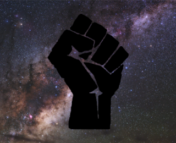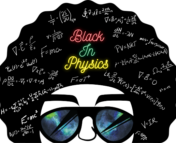It’s Black History Month in the U.S., February 2021! We will be continuing our ongoing series #BlackInAstro this month. For our cornerstone post, see here.
The 237th American Astronomical Society (AAS) Meeting was held virtually this year from Jan 11th-15th, 2021, where the meeting organizers and participants organized several discussions around inclusive pedagogy, and to take steps towards diverse and equitable astronomy communities. One such event, The AAS237 Special Session on Anti-Blackness in Astronomy, focused specifically on the lived experiences of early-career Black astronomers and physicists in the U.S.
This session, hosted by Dra. Nicole Cabrera Salazar and Prof. Lia Corrales (AAS Committee on the Status of Minorities in Astronomy, CSMA), was led and moderated by Ashley Walker (graduated from Chicago State University, applying to graduate schools, she/her), with a panel comprising junior Black astronomers and physicists Caprice Phillips (2nd year PhD student, Ohio State University, she/her), Erin Flowers (4th year PhD student, Princeton University, she/her), and David Zegeye (2nd year PhD student, The University of Chicago, he/him).
The session began with a discussion on how the panelists decided to pursue a career in astronomy. Caprice and Erin noted how few Black astronomers they had as role models growing up (apart from Neil degrasse Tyson and Jedidah Isler), and how important it was to have supportive family and friends who played an instrumental role in helping build interest in physics and astronomy. David brought up the connection that astronomy has to people’s lived experiences and in real life situations in Ethiopia and Eritrea (where his family is from), such as planting crops and the connection to the spectacular night sky at different times of the year.
This was followed by a discussion on what it meant for the panelists to be Black in the U.S. The panelists spoke of their experiences living in segregated cities with underfunded infrastructure, a systemic structure that is racist and actively pushes Black folks down. Moreover, the need for Black folks to be exceptional, work much harder than their colleagues, and prove that Black astronomers are not just a product of diversity initiatives is a constant challenge and a reality. Caprice talked about being invisible and hypervisible at the same time no matter the circumstances (see studies of this reported effect here and here), with Ashley mentioning the constant profiling of the appearances and mannerisms of Black astronomers in the field and beyond.
The panelists pivoted to the theme of anti-Blackness, and how it manifested in predominantly white spaces; panelists expressed concerns that diversity initiatives announced as a result of events in Summer 2020 were mostly lip service, without any concrete actions attached. Caprice mentioned that this anti-Blackness results in both the barriers to entry (e.g. the Physics GRE) and the spaces being unsafe for Black folks. Generally, the panelists agreed that predominantly white institutions are doing an extremely inadequate job of training and creating space for Black graduate students. The numbers are clear: only <100 Black women have ever received PhD degrees in Physics in the US (and only 23 in Astronomy and Planetary sciences).
The panelists agreed that people working in and attending predominantly white institutions (PWIs) needed to start learning about their privilege and concepts such as white fragility, and urgently take steps needed to make spaces inclusive for Black folks entering astrophysics. The panelists concurred that excuses like “our diversity initiatives are already doing enough,” “at least we aren’t physics” (e.g. in astronomy programs), and “the problem is with the applicant pool, not us” are inadequate and dangerous responses to the current crisis. This was followed by a concern about anti-Blackness within communities of people of color (POC). The panelists noted that POC (as well as white astronomers) could be allies by supporting Black astronomers academically, financially, and in professional and social community spaces. This community support has to be present throughout, whether or not Black astronomers fit into the ‘ideal’ mold of a professional astronomer (from the perspective on non-Black members of the community.)
Looking towards the future — both immediate and beyond — the session panelists were excited for upcoming #BlackinAstro events in 2021. Erin was glad to see the community bringing back ethnic and indigenous practices within the scope of astronomy, and decentralizing the Western ideas of what an astronomer looks like. Caprice hopes to participate in an astronomy community that allows Black folks to be and exist just like their peers – treated as scientists and colleagues. David aspires for a world in which all Black folks, including astronomers, were free (in every sense of the word), with a nod to the acknowledgment and nurturing of Ethiopian and Eritrean astronomy.
This panel discussion was a powerful start to one of the largest virtual meetings in our field, and a reminder to all folks — regardless of rank — that if we are to envision a truly anti-racist Astrophysics community, we need to acknowledge and learn from the lived experiences of Black astrophysicists, as well as provide financial, academic and community support.
- The Astrobites coverage of AAS237 Day1, including a summary of this panel discussion, can be found here.
- You can find the Astrobites Twitter coverage of the panel by Michael Hammer here.
- Astrobites #BlackInAstro: How Can We Support Black Astronomers?
- Astrobiter Briley Lewis’ thread on a question at the panel discussion, and the following response by Ashley Walker.
- Check out Astrobites articles by David Zegeye and Ashley Walker.
With input from: Lía Corrales
Edited by: Kate Storey-Fisher


